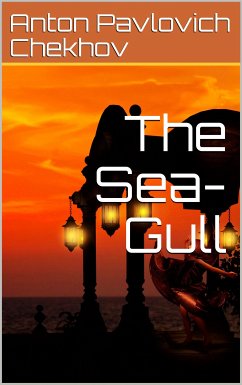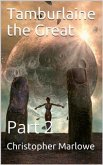The Seagull is a play by Russian dramatist Anton Chekhov, written in 1895 and first produced in 1896. The Seagull is generally considered to be the first of his four major plays. It dramatises the romantic and artistic conflicts between four characters: the famous middlebrow story writer Boris Trigorin, the ingenue Nina, the fading actress Irina Arkadina, and her son the symbolist playwright Konstantin Tréplev.
Though the character of Trigorin is considered Chekhov's greatest male role, like Chekhov's other full-length plays, The Seagull relies upon an ensemble cast of diverse, fully developed characters. In contrast to the melodrama of mainstream 19th-century theatre, lurid actions (such as Konstantin's suicide attempts) are not shown onstage. Characters tend to speak in ways that skirt around issues rather than addressing them directly; in other words, their lines are full of what is known in dramatic practice as subtext.
The opening night of the first production was a famous failure. Vera Komissarzhevskaya, playing Nina, was so intimidated by the hostility of the audience that she lost her voice. Chekhov left the audience and spent the last two acts behind the scenes. When supporters wrote to him that the production later became a success, he assumed that they were merely trying to be kind. When Konstantin Stanislavski, the seminal Russian theatre practitioner of the time, directed it in 1898 for his Moscow Art Theatre, the play was a triumph. Stanislavski's production of The Seagull became "one of the greatest events in the history of Russian theatre and one of the greatest new developments in the history of world drama".
The play takes place on a country estate owned by Pjotr Sorin, a retired senior civil servant in failing health. He is the brother of the famous actress Irina Arkadina, who has just arrived at the estate for a brief vacation with her lover, the writer Boris Trigorin. Pjotr Sorin and his guests gather at an outdoor stage to see an unconventional play that Irina's son, Konstantin Treplyov, has written and directed. The play-within-a-play features Nina Zarechnaya, a young woman who lives on a neighboring estate, as the "soul of the world" in a time far in the future. The play is Konstantin's latest attempt at creating a new theatrical form, and is a dense symbolist work. Irina laughs at the play, finding it ridiculous and incomprehensible; the performance ends prematurely after audience interruption and Konstantin storms off in humiliation. Irina does not seem concerned about her son, who has not found his way in the world. Although others ridicule Konstantin's drama, the physician Yevgeny Dorn praises him.
Act I also sets up the play's various romantic triangles. The schoolteacher Semyon Medvedenko loves Masha, the daughter of the estate's steward, Ilya Shamrayev and his wife Polina Andryevna. Masha, in turn, is in love with Konstantin, who is in love with Nina, but Nina falls for the writer, Boris. Polina, married to Ilya, is in an affair with the doctor, Yevgeny. When Masha tells Yevgeny about her longing for Konstantin, Yevgeny helplessly blames the lake for making everybody feel romantic.
Read this complete famous novel for further interesting story....
Hinweis: Dieser Artikel kann nur an eine deutsche Lieferadresse ausgeliefert werden.
Though the character of Trigorin is considered Chekhov's greatest male role, like Chekhov's other full-length plays, The Seagull relies upon an ensemble cast of diverse, fully developed characters. In contrast to the melodrama of mainstream 19th-century theatre, lurid actions (such as Konstantin's suicide attempts) are not shown onstage. Characters tend to speak in ways that skirt around issues rather than addressing them directly; in other words, their lines are full of what is known in dramatic practice as subtext.
The opening night of the first production was a famous failure. Vera Komissarzhevskaya, playing Nina, was so intimidated by the hostility of the audience that she lost her voice. Chekhov left the audience and spent the last two acts behind the scenes. When supporters wrote to him that the production later became a success, he assumed that they were merely trying to be kind. When Konstantin Stanislavski, the seminal Russian theatre practitioner of the time, directed it in 1898 for his Moscow Art Theatre, the play was a triumph. Stanislavski's production of The Seagull became "one of the greatest events in the history of Russian theatre and one of the greatest new developments in the history of world drama".
The play takes place on a country estate owned by Pjotr Sorin, a retired senior civil servant in failing health. He is the brother of the famous actress Irina Arkadina, who has just arrived at the estate for a brief vacation with her lover, the writer Boris Trigorin. Pjotr Sorin and his guests gather at an outdoor stage to see an unconventional play that Irina's son, Konstantin Treplyov, has written and directed. The play-within-a-play features Nina Zarechnaya, a young woman who lives on a neighboring estate, as the "soul of the world" in a time far in the future. The play is Konstantin's latest attempt at creating a new theatrical form, and is a dense symbolist work. Irina laughs at the play, finding it ridiculous and incomprehensible; the performance ends prematurely after audience interruption and Konstantin storms off in humiliation. Irina does not seem concerned about her son, who has not found his way in the world. Although others ridicule Konstantin's drama, the physician Yevgeny Dorn praises him.
Act I also sets up the play's various romantic triangles. The schoolteacher Semyon Medvedenko loves Masha, the daughter of the estate's steward, Ilya Shamrayev and his wife Polina Andryevna. Masha, in turn, is in love with Konstantin, who is in love with Nina, but Nina falls for the writer, Boris. Polina, married to Ilya, is in an affair with the doctor, Yevgeny. When Masha tells Yevgeny about her longing for Konstantin, Yevgeny helplessly blames the lake for making everybody feel romantic.
Read this complete famous novel for further interesting story....
Hinweis: Dieser Artikel kann nur an eine deutsche Lieferadresse ausgeliefert werden.









